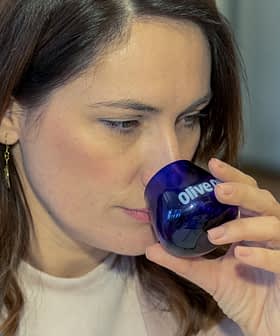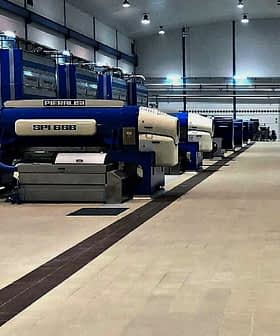This Olive Oil Importer Knows How to Find Winners
For 30 years, Rolando Beramendi has been importing his favorite Italian olive oils to the U.S., one harvest at a time.
 Vincenzo Paterno (left) and Rolando Bernamendi (right) at Domus Olivae, Sicily
Vincenzo Paterno (left) and Rolando Bernamendi (right) at Domus Olivae, SicilyThere are few things that Rolando Beramendi loves more than cooking, so it was not surprising when he offered to prepare dinner for his newly-anointed inlaws during the Christmas of 1987.
The soon-to-be-founder of Manicaretti Italian Foods Importers had just completed his degree in agricultural economics from the University of California, Davis, and went to spend the first holiday season with his wife in the mountains of northern Italy.
Every harvest is different, so I want to be there and be with them. I need to see (the harvest) and taste all of the oils.
“We went to spend the Christmas holidays in the Alps, to get to know the families and somebody showed up with a big basket one time for dinner,” Beramendi told Olive Oil Times.
“There were all these wonderful ingredients – artisanal pasta, unfiltered extra virgin olive oil, arugula, pesto, peperonata – and it was all so delicious,” he added. “I was only 22 years old at that time and I said, ‘I’ve never seen these things before. Can I make dinner?’ ”
See Also:Producer ProfilesThe meal turned out to be a watershed moment for the native of Patagonia, who grew up eating home-cooked meals prepared with local olive and grapeseed oils, before leaving Argentina at the onset of the Falklands War to study in the United States.
Back in Italy, Beramendi quickly got to talking about food and before too long some of his new family and friends asked him to help them solve a long-running problem: how to effectively export these artisanal products to the lucrative American market.
“I didn’t have a business plan, I didn’t have anything,” he said. “The only thing that I knew how to do was to create a pricing structure because of my degree, but I saw an opportunity there and I made a lot of appointments with different distributors and importers in the Bay Area.”
Olive oil was on the bottom shelf of the ethnic food aisle in grocery stores. People used to treat it the way that they treat fish sauce nowadays.
Beramendi returned to California and tried to convince retailers that extra virgin olive oil would be a big hit with American consumers, but most of them told him the product was too esoteric for the American palate.
“At that time, olive oil was on the bottom shelf of the ethnic food aisle in grocery stores,” he said. “People used to treat it the way that they treat fish sauce nowadays.”
However, Beramendi was not easily deterred and eventually convinced four stores in the Bay Area to sell the unfiltered extra virgin olive oil, which he imported from Tuscany. By August 1989 – four months after it was founded – Manicaretti Italian Foods Importers was in business.
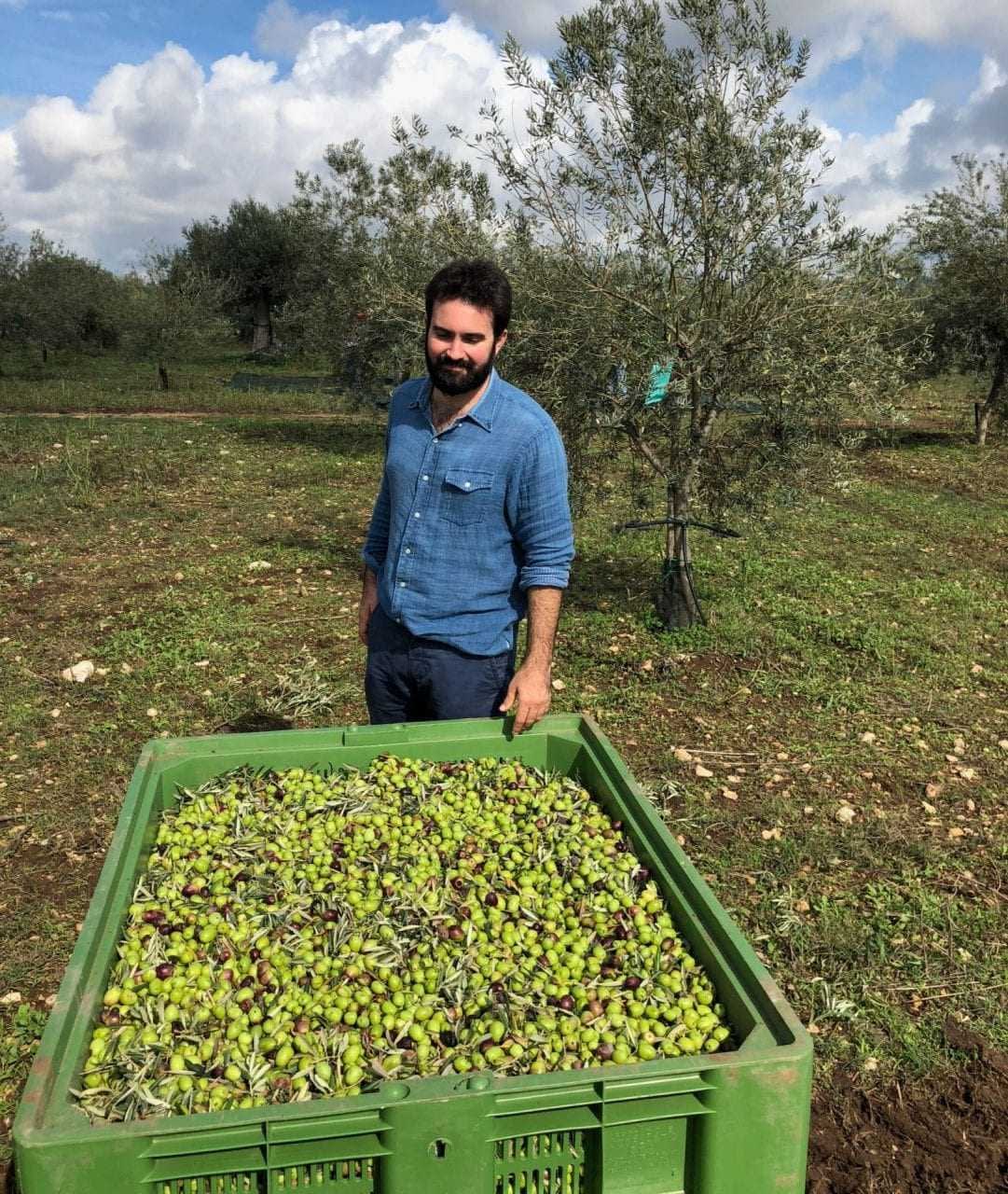
Freshly picked Tonda Iblea organic olives at Vincenzo Paterno’ di Spedalotto in Chiaramonte Gulfi, Ragusa, Sicily
“It was the first time that I think people saw unfiltered olive oil from Tuscany on the shelves and that created quite a commotion,” he said. “Nobody had ever tasted anything so fresh.”
Beramendi’s prediction turned out to be correct and the oil started to catch on. Soon he was going to various stores and doing demonstrations with his fresh Tuscan extra virgin olive oils.
“At that time, it was the only way to get people to taste new things and it almost felt like I was selling one bottle a time every day,” he said. “Unfiltered olive oil was what changed the conversation.”
By the time Beramendi began selling his unfiltered extra virgin olive oil in 1989, Californians had seen a culinary revolution. Led by chefs and restaurateurs, demand was rapidly growing for fresh, organic and healthy ingredients and foods.
While a large emphasis of the movement was on local and seasonal foods, many chefs still looked to Europe for inspiration, specifically the countries in which the Mediterranean diet reigned supreme.
“I was very fortunate to be in San Francisco and the Bay Area at the right time,” Bermanendi said. “They [local chefs] were really interested in European products because they were not available in California. Thanks to the American chefs these products found their home in California.”
However, the same movement that proved to be a tailwind for Beramendi’s importing project eventually transformed into a headwind. Soon the demand for local products began to outweigh the allure of imported ones.
Changing consumer trends paired with increasing production of extra virgin olive oil in California soon meant Beramendi’s more expensive imports could no longer compete. This, combined with the logistical difficulties of importing to California and traveling to and from Italy, led Beramendi to relocate to New York City in 1995.
Beramendi continued cooking for chefs and doing demonstrations with his growing portfolio of olive oils on the East Coast and quickly found his niche, selling to restaurants and specialty food stores.
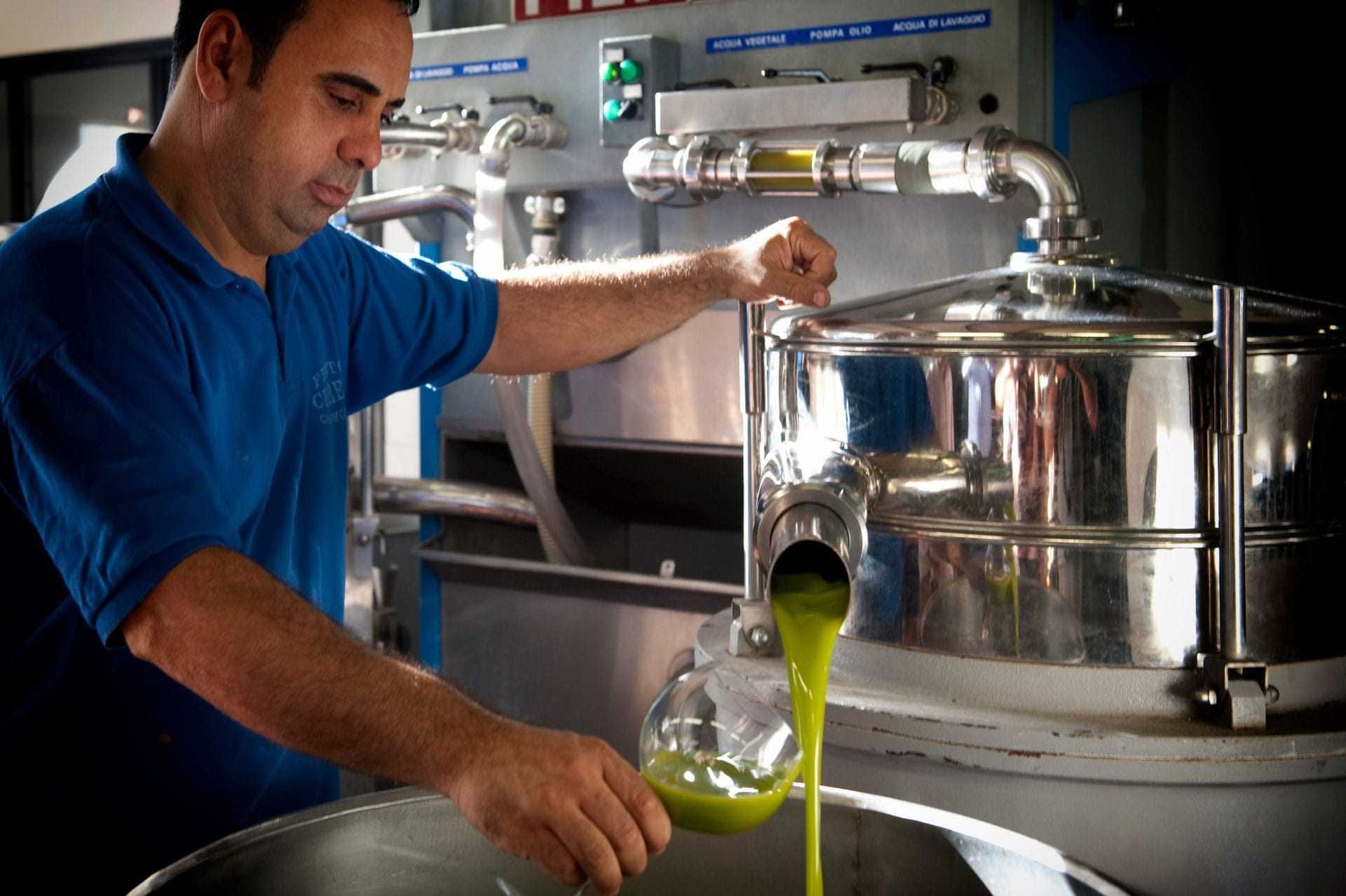
Salvatore Cutrera, of Frantoi Cutrera, tastes his freshly extracted olive oil
Focusing on quality is Beramendi’s creed and, eventually, he began to enter some of the best olive oils that he imported into competitions. At the 2020 NYIOOC World Olive Oil Competition, Manicaretti Italian Foods Importers earned eight Gold Awards for their imported products.
It’s not like an Oscar, where only the actor or actress gets the award. There’s an entire social and economic circle around the producer who get to celebrate.
“This news made them jump out of their seats and they bragged about it for weeks,” Beramendi said about the winning producers’ reactions to the news of their success. “It’s great validation for everyone who is involved, not just the producer, but the millers and the harvesters too.”
“It’s not like an Oscar, where only the actor or actress gets the award,” he added. “There’s an entire social and economic circle around the producer who get to celebrate, especially this year with everything that’s going on. It was the highlight of the year.”
As the Covid-19 pandemic has ravaged both Italy and the United States, Manicaretti has found mixed fortunes.
“We’ve always sold 50 percent to restaurants and 50 percent to specialty food stores,” he said. “For obvious reasons, now our restaurant business is zero, but the retail sales have skyrocketed, so we’re pretty close to even.”
In spite of challenges created by the pandemic, Beramendi is confident that Manicaretti will weather the storm.
Winning multiple awards at the world’s most prestigious olive oil quality competition serves as a buoy for the company. The awards demonstrate to his clients that his rigorous selection process and hands-on approach to importing high-quality olive oil works.
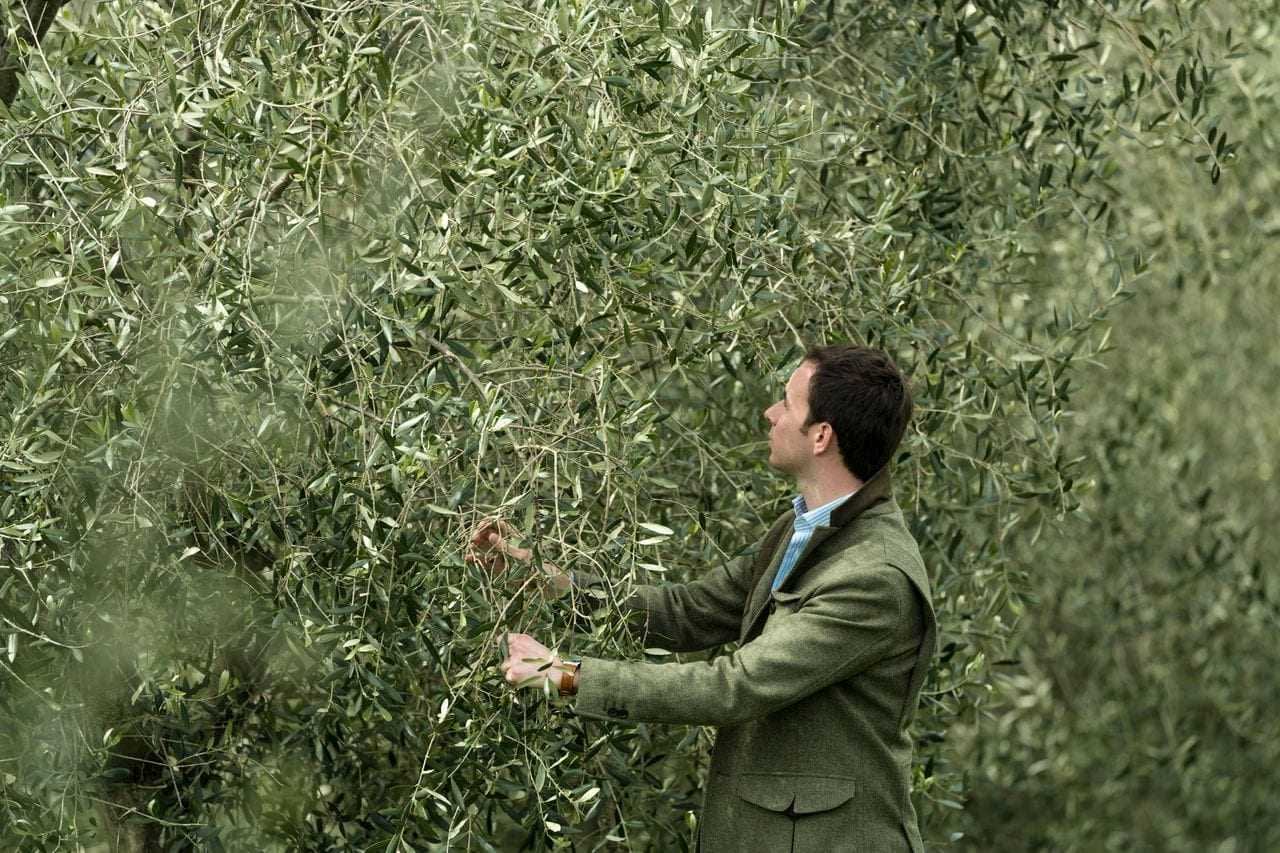
Matteo Frescobaldi inspects the olive trees responsible for his award-winning Laudemio
“I’m constantly getting reports from each and every one of our producers on what’s happening,” he said. “I want to know that they are pruning in March. I ask them for pictures of the bloom.”
Beramendi pays close attention to these small details. While he has a large portfolio of olive oils that he imports, each year the make up is different. He points out that olive oil is just like wine. Each harvest is unique and it is difficult to compare to previous ones.
“Every harvest is different, so I want to be there and be with them,” he said. “I need to see [the harvest] and taste all of the oils. Then according to how we feel with the particular harvest we might buy a lot [or none at all].”
“For the past 30 years, I have always been in Italy during the time of harvest and pressing,” he added.
Beramendi begins each harvest season in Sicily, where he sources a plurality of his olive oils, including the Gold-Award-winning Spedalotto Tonda Iblea DOP, Sapori Divini and Titone.
“Sicily is number one right now. For the last four years, Sicily has been really commanding the lead,” he said. “What has led Sicily into the future of olive oil is that they have done a lot to improve, [for example] Frantoio Cutrera with its new mill technology.”
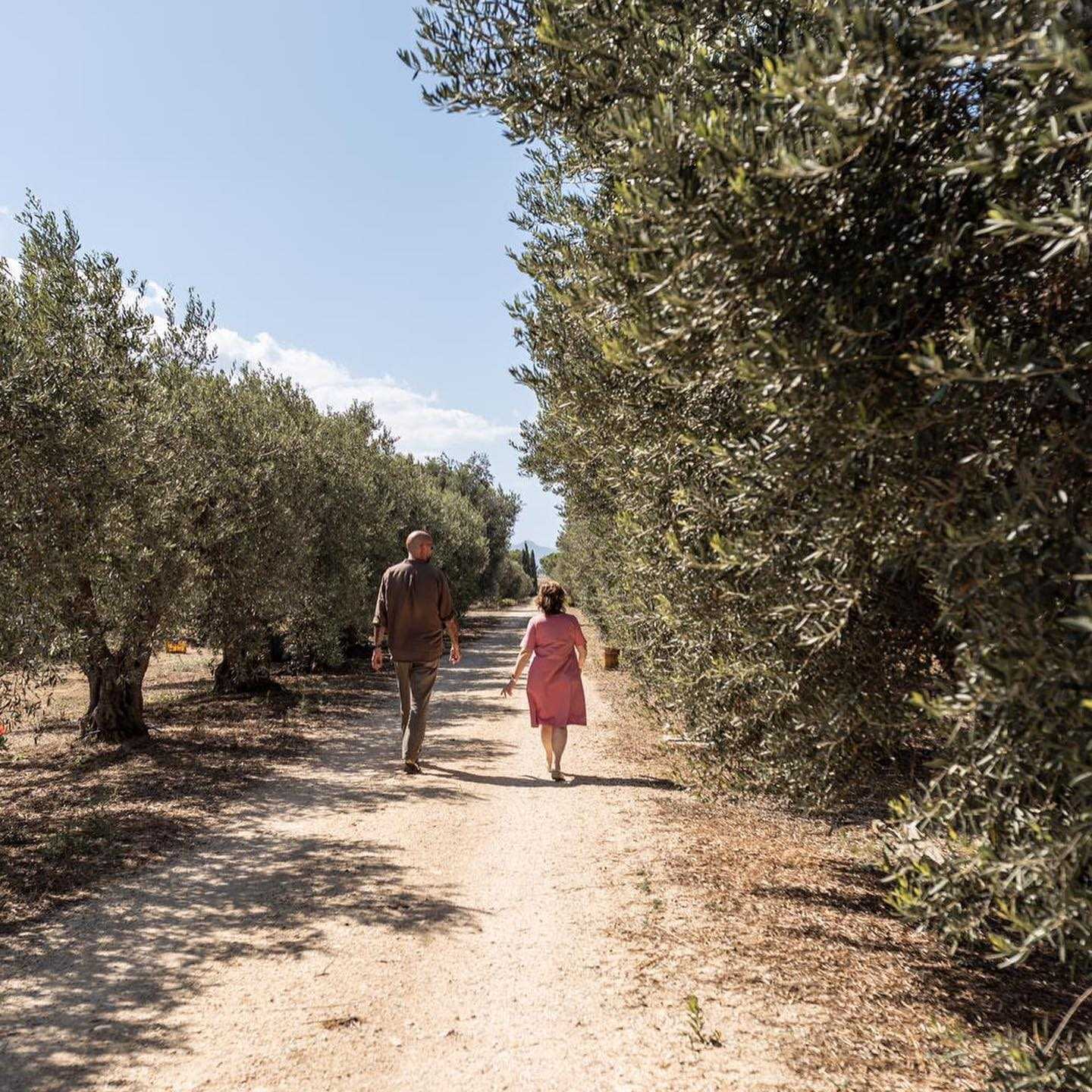
Beramendi inspecting the olive groves with Antonella Titone, in Trapani, Sicily
From Sicily, Beramendi flies on to Puglia – where the award-winning Crudo is produced – before continuing north to Tuscany, where he sources Frescobaldi Laudemio and Castello Colle Massari IGP.
Depending on how the harvest has gone, Beramendi visits other regions too. At the 2020 NYIOOC, Manicaretti earned two Gold Awards for the Rustichella d’Abruzzo oils it imports from Abruzzo.
Overall, the company imports olive oil and other food products from 38 producers spread across 15 regions.
“You need to be there, you need to be in it,” Beramendi said. “Every year, the olive oil is different. I always try to think about why this product is what it is.”





